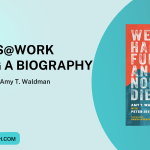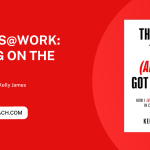Question Everything
I’m delighted to welcome to the blog my editor and the March Write Now! Mastermind guest, Melissa Anne Wuske. I met Melissa just about a year ago, when she began editing my book, Write-A-Thon. Melissa has great advice for all of us as we work to edit our own writing: question everything. Read on to learn what she means by this!
 The Key to Successful Self-Editing: Question Everything
The Key to Successful Self-Editing: Question Everything
By Melissa Anne Wuske
Question everything. That seems like slightly dangerous advice to give to writers who—at least allegedly—are a very neurotic bunch. But as an editor, it’s what I do.
When I introduce myself as an editor, people often say, “Oh, so you read all day.” That’s partly true. I do read all day. I also look things up all day; I question authors all day. My work generates an Internet history full of seemingly random and asinine queries (especially at Merriam-Webster where I look up even the simplest of words just to be absolutely certain). I create margins full of questions, ideas, and wonderings. I get antsy when my Chicago Manual of Style isn’t within arm’s reach to confirm my every stylistic decision. It’s my job to be meticulously inquisitive.
As author—or rather as a reviser—your job is much the same. You’ve got a finished draft in front of you. You sigh in relief and accomplishment. But now it’s time to dredge up everything you put into the draft and put it all back on the table. It’s time to cut, add, rewrite, research, or reformat. It’s time to question everything. No aspect of a draft is safe from a true reviser.
To begin, read your draft like a three year old. Pepper yourself with simple questions: How? Why? What’s that? Take time to thoroughly answer each question—toddlers are never satisfied with one-word answers. Just like when a child asks these types of questions, you’ll sometimes find the answers tough to explain or discover that they reveal missing information, misunderstandings, or confusion. Often they’ll also point out the obvious—places where things are going well.
Remember, the point of this relentless nitpicking is not to tear down your draft; it’s to build it up. Editing your draft is the first defense, at least mentally, against a first-reader who is, shall we kindly say, very thorough and direct. Imagine that your inner (or outer) skeptic is pestering you with questions as you rework your draft—and try to beat it to the punch.
Take this process in small bites. It’s overwhelming and can beat you into the ground. Don’t let the process win. Take breaks and treat yourself along the way, and make a habit of reminding yourself why you’re writing this piece and what you love about it. This type of editing is like deep introspection or a tough workout: it really takes it out of you, but in the end you’ll emerge with a clear-minded draft that’s lean and sleek.
Here are some questions to get you started editing. I’ve split them up between fiction and nonfiction, but some of the same concepts apply to each, so I’d recommend reading through both lists.
Nonfiction
1. Is the format working? Do I need more sidebars, more sources, shorter paragraphs, fewer charts?
2. What question or problem am I answering for readers? (Not what question or problem did I intend to answer.)
3. What information is missing—as a whole and paragraph-by-paragraph, sentence-by-sentence? Does the information I present lead readers from point to point, one step at a time?
4. Is my tone right for the material? Will my intended audience feel at home with this tone?
5. Do transitions and headings do their job adequately in helping readers go from one idea to the next?
6. Where will readers be the most engaged or intrigued? Where will they get bored?
7. Are my style, word choice, and structure clear, straightforward, and appropriate?
Fiction
1. Does the story arc work? Is it engaging?
2. Is the highest tension point where it’s supposed to be? Does each scene build to that particular incident?
3. Is the backstory needed and well placed?
4. Are the characters true to themselves? Do they keep consistent personalities? Do they say and do things that are based only on what they know in the story—not what the author or reader knows?
5. Do my descriptions and pacing build necessary suspense without belaboring the story? Where will my intended readers say, “For heaven’s sake, just get on with it”? When do I need to slow down to keep readers’ attention and guide them through the action?
6. Do the settings and transitions guide and orient the reader throughout the story?
7. How’s the balance of poetic elements to plot elements—does it fit my goal or genre? Are there too many metaphors and too little action? Do I have too much dialogue and not enough symbolism?
About the Author: Melissa Anne Wuske (melissaannewuske.com) is a freelance writer and editor. She works for a variety of clients from magazine and book publishers to marketing firms and business professionals to independent authors. She is a former editor for Writer’s Digest Books. She edited 8-10 books each year on the craft and business of writing. As a result, she has a unique window in to the inner workings of the publishing world and the writing life. Through her work, she’s had the opportunity to work with bestselling authors and industry leading agents, but she enjoys working with everyday writers most. Melissa is also the communications director for Stop Traffick Fashion, a boutique that sells jewelry, handbags, and t-shirts made by survivors of human trafficking. There she coordinates the blog, writes web copy, and handles promotional correspondence. She loves merging her passions for writing and for helping provide restoration for exploited people.
Wuske graduated from Miami University with a degree in Adolescent English Education and is a former middle school language arts teacher. Melissa loves reading and writing short stories and hopes to publish a collection someday. She lives in Cincinnati with her husband who is a youth minister.















Did you get this title from the Euripides quote? “Question everything. Learn something. Answer nothing.”
KDowning, no, I’m not familiar with that quote—but I love it. Thanks for bringing it to my attention!
Pingback : Top Picks Thursday 03-22-2012 « The Author Chronicles